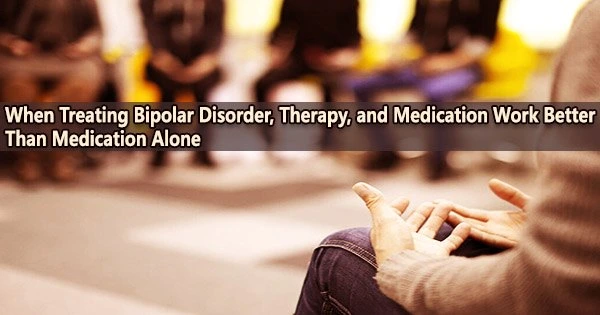Bipolar disorder, also known as manic-depressive illness, is a mental health condition characterized by extreme mood swings that alternate between high and low phases. There are several types of bipolar disorder, including bipolar I disorder, bipolar II disorder, and cyclothymic disorder, among others.
Researchers from UCLA and their colleagues from other institutions conducted a review of 39 randomized clinical trials and discovered that the combination of medication and psychoeducational therapy is superior to medication alone in preventing the recurrence of illness in people with bipolar disorder.
The exact cause of bipolar disorder is unknown, but a combination of genetic, biological, and environmental factors are thought to play a role. Treatment for bipolar disorder typically involves a combination of medication, psychotherapy, and lifestyle changes, such as getting regular exercise and practicing good sleep hygiene.
Researchers examined studies that involved adult and adolescent bipolar disorder patients who were randomly assigned to either active family, individual, or group therapy or “usual care,” which refers to medication with routine monitoring and support from a psychiatrist. The research was published in JAMA Psychiatry.
Not everyone may agree with me, but I think the family environment is very important in terms of whether somebody stays well. There’s nothing like having a person who knows how to recognize when you’re getting ill and can say, ‘you’re starting to look depressed or you’re starting to get ramped up.’ That person can remind their loved one to take their medications or stay on a regular sleep-wake cycle or contact the psychiatrist for a medication evaluation.
David Miklowitz
David Miklowitz, PhD, the study’s lead author, and a distinguished professor of psychiatry at the Jane and Terry Semel Institute for Neuroscience and Human Behavior at UCLA, said the studies examined included study attrition or dropout rates, rates of recurrence of bipolar disorder, depression, and mania symptoms, and followed patients for at least a year.
The findings were:
Psychoeducation with guided practice of illness management skills (for example, how to keep regular sleep and wake cycles) in a family or group format was more effective in reducing recurrences of mania and depressive symptoms than the same strategies in an individual therapy format.
Compared to other treatment modalities, cognitive behavioral therapy, family therapy, and interpersonal therapy were more effective at stabilizing depression symptoms.
Rates of dropout were lower in patients who received family-oriented therapies.
Of the findings, Miklowitz said they point to the importance of having a support system.
“Not everyone may agree with me, but I think the family environment is very important in terms of whether somebody stays well,” he said. “There’s nothing like having a person who knows how to recognize when you’re getting ill and can say, ‘you’re starting to look depressed or you’re starting to get ramped up.’ That person can remind their loved one to take their medications or stay on a regular sleep-wake cycle or contact the psychiatrist for a medication evaluation.”
Miklowitz said the same is true for a patient who may not have close relatives but does have support through group therapy.
“If you’re in group therapy, other members of that group may be able to help you recognize that you’re experiencing symptoms,” he said. “People tend to pair off. It’s a little bit like the AA model of having a sponsor.”





